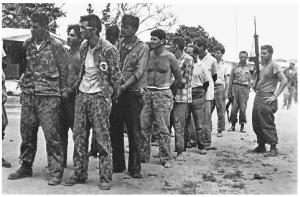
CONFUSED BAY OF PIGS COMBATANTS
Criminals In Action (CA) explained to Judge Kessler of the US District Court in Washington DC that releasing the final volume of its three-decade-old history of the 1961 Bay of Pigs debacle would “confuse the public,” and should be withheld because it is a “predecisional” document. Wow. And I thought that I had heard them all.
On the 50th anniversary of the Bay of Pigs invasion, the National Security Archive filed a Freedom of Information Act lawsuit for the release of a five-volume CIA history of the Bay of Pigs affair.
In response to the lawsuit, the CIA negotiated to release three volumes of the history — the JFK Assassination Records Review Board had already released Volume III– with limited redaction, currently available on the National Security Archive’s website.
At the time, the Director of the National Security Archive’s Cuba Documentation project, Peter Kornbluh, quipped that getting historic documents released from the CIA was “the bureaucratic equivalent of passing a kidney stone.”
He was right. The Agency refused to release the final volume of this history, and the National Security Archive is not giving up on the fight.
Volume five of the history, written by CIA historian Jack Pfeiffer –who sued the CIA himself to release the history in 1987, and lost– is described by the CIA as an “Internal Investigation document” that “is an uncritical defense of the CIA officers who planned and executed the Bay of Pigs operation.
It offers a polemic of recriminations against CIA officers who later criticized the operation and against those U.S. officials who its author, Dr. Pfeiffer, contends were responsible for the failure of that operation.”
While Dr. Pfeiffer’s conclusions may or may not be true, FOIA case law appears to be pretty clear that Americans –who funded the operation and Dr. Pfeiffer’s histories– have the right to read this document and decide for themselves its merits.
Despite the claims of the CIA’s chief historian David Robarge, the document should not remain in the CIA vaults because its conclusions “could cause scholars, journalists, and others interested in the subject at hand to reach an erroneous or distorted view of the Agency’s role.”
Historians, after all, are well trained in treating documents –especially CIA hagiographies sources– skeptically.
To prevent the public from reading this volume, the CIA has argued that because it is a draft, it is a predecisional document and can be denied under exemption b(5) of the FOIA.
Except –as Davis Sobel, counsel to the National Security Archive points out in our motions– the case law states otherwise.

No comments:
Post a Comment